The International Treatment Preparedness Coalition (ITPC) has just released its latest report, entitled “Rationing Funds, Risking Lives: World Backtracks on HIV Treatment.” In the document, the group shows that the decreased commitment governments and international organizations show towards handling AIDS is already beginning to show worrying signs, including more and more frequent drug stuck outs, less people enrolled in treatment programs, and overall failure of national HIV/AIDS budgets. The situation is worst in African countries, which are also the least capable of supporting such programs form a financial perspective.
“AIDS is not over. ITPC's report clearly shows that the response is being starved, not over-funded. Governments, North and South, cannot afford to put the clock back and return us to the days when HIV was a death sentence,” says the coordinator of the new document, ITPC expert Aditi Sharma. Over recent years, for reasons that even then made no sense to sane, civilized people, many governments decided to reduce funding for keeping AIDS under control, which is basically the same thing as condemning all people who have the dreaded virus to death. Non-profit organizations cannot bear the burden of keeping AIDS in check on an entire continent all by themselves.
Major donors that usually contributed to relief efforts, such as the US President's Emergency Plan for AIDS Relief (PEPFAR ) and the Global Fund to Fight AIDS, have experienced budget cuts, and are no longer able to invest heavily in diseases control. A total of about $20 billion would be needed to fight AIDS, but G8 countries say that gathering even $13 billion would be a “huge stretch.” But this money would be absolutely insufficient for medicine and management. Therefore, it is absolutely clear that the leaders of these nations are aware they are sentencing people to death by their decision.
“In my home country, Uganda, for the first time since 2004, some HIV-positive men and women who are in need of life-saving antiretroviral treatment are being turned away because of funding cuts. Our greatest fear is that we may have to ration HIV medications for those already receiving treatment. How do you tell an HIV-positive mother that she can no longer have the drugs she needs to stay alive? ITPC's report makes it painfully clear that Uganda is not alone in facing an escalating treatment crisis,” says Joint Clinical Research Center expert Peter Mugyenyi.
“Providing access to AIDS treatment for four million people has been the most ambitious public health effort in history. Around the world thousands of doctors, nurses, legislators, and activists helped make treatment scale-up possible. Now a few power brokers and politicians who claim AIDS receives too much money seem intent on bringing to an end this remarkable effort, in effect saying to millions of people: drop dead. Without treatment, this is certainly their fate,” concludes Gregg Gonsalves, also of ITPC.

 14 DAY TRIAL //
14 DAY TRIAL //